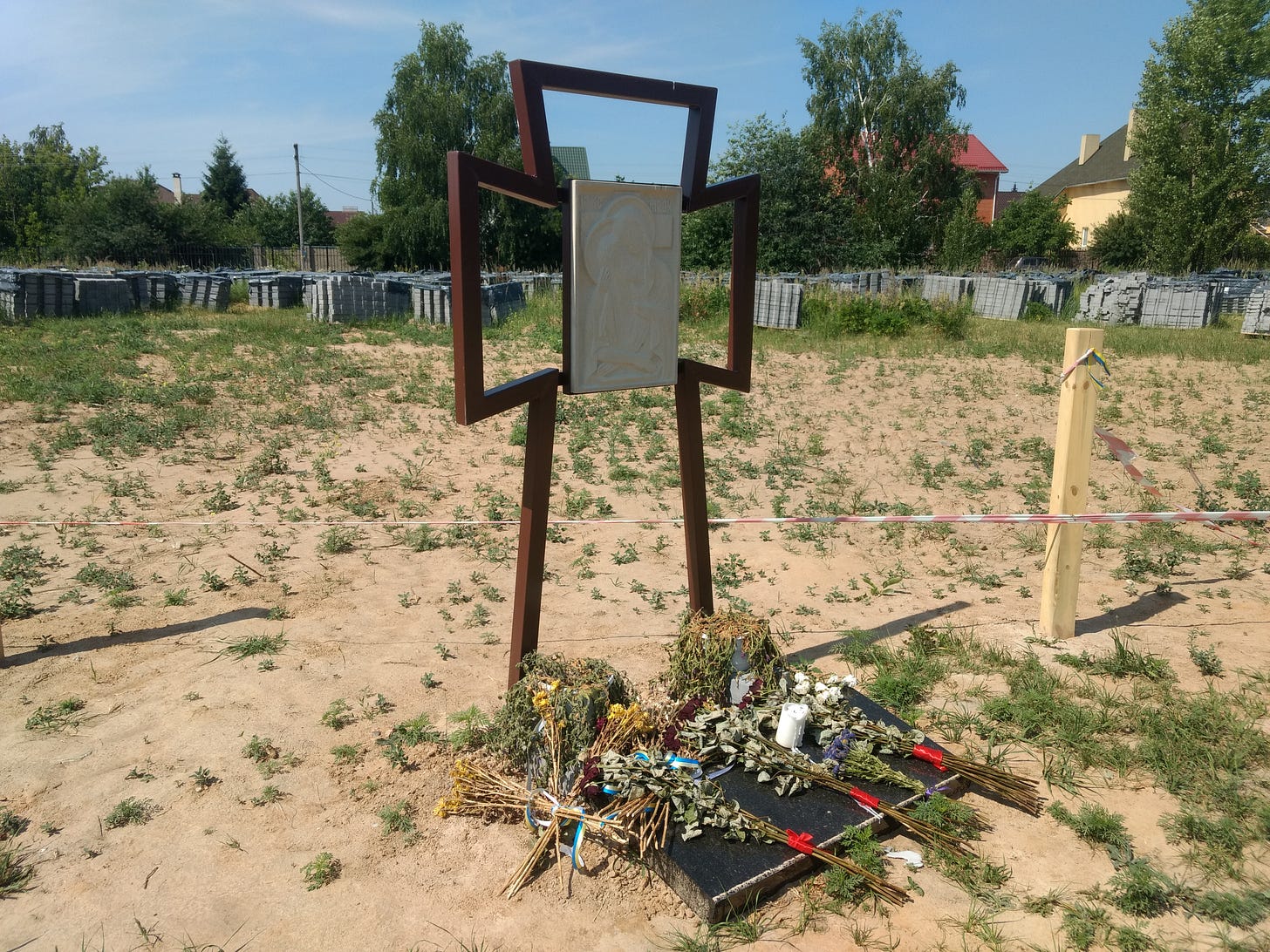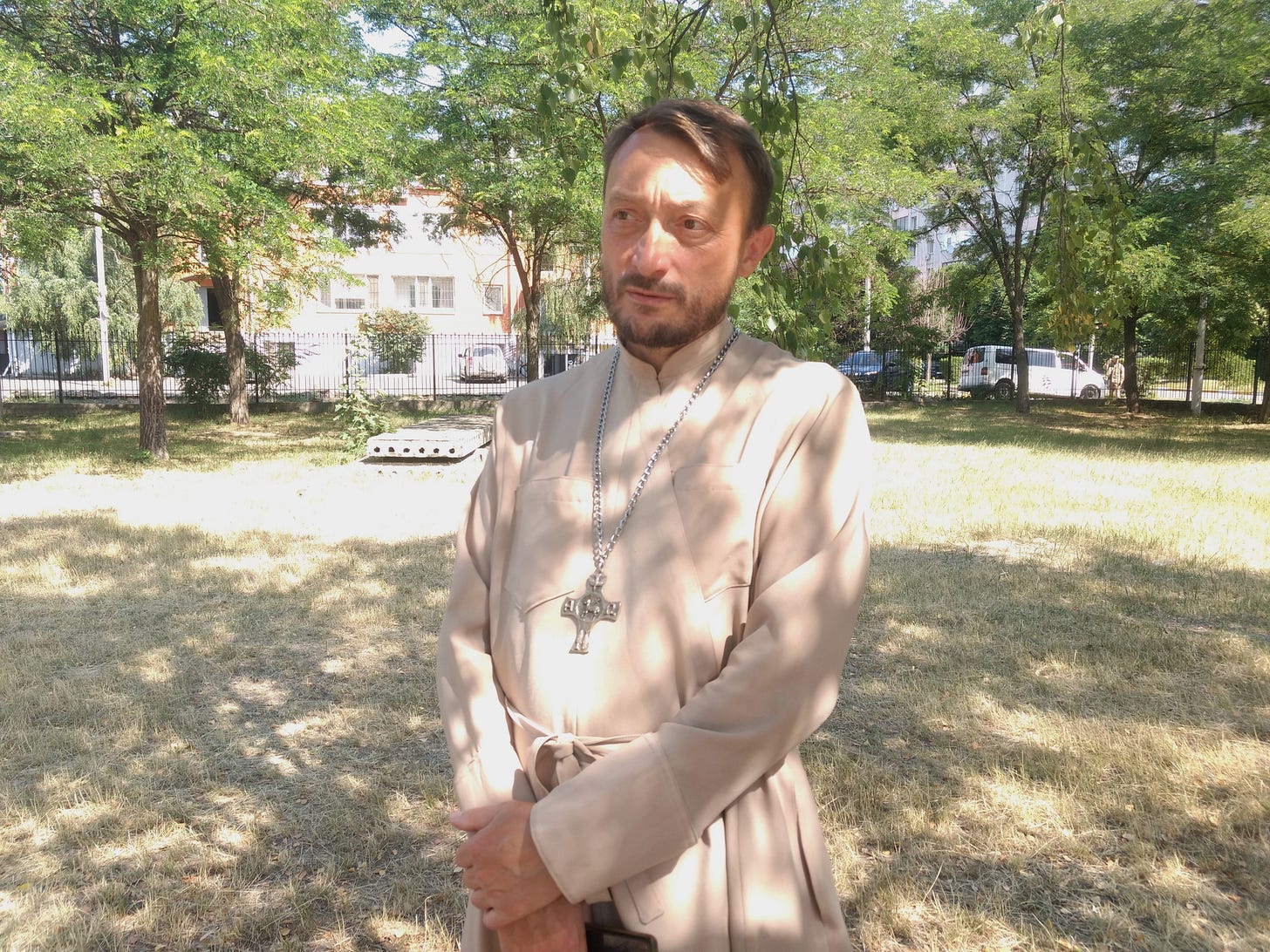A cross marks the former site of a temporary mass grave on the grounds of the Church of St. Andrew in Bucha, Ukraine. (c. Martin Kuz)
Tomorrow represents a day of hope and renewal for Western Christians as they celebrate Easter. In Ukraine, an Eastern Orthodox country that will observe the holiday in May, March 31 stirs heavier emotions. On that date two years ago, Ukrainian troops liberated the city of Bucha and exposed Vladimir Putin’s “special military operation” for what it is: genocide.
The Russian siege and occupation of the Kyiv suburb lasted less than five weeks. In that brief span, the invading forces killed more than 1,400 civilians. Most were shot; many showed signs of mutilation, torture and rape. Ukrainian soldiers found them where they died — in cars and yards, homes and shops. A dozen lay scattered along a main thoroughfare, their skin gray, their bodies contorted.
I visited Bucha a short time later and met archpriest Andriy Galavin at the Church of St. Andrew. During the occupation, with Russian tanks and troops blocking the route to the main cemetery, the city’s morgue reached capacity. The mayor asked Father Galavin if workers could dig a large trench on church grounds to serve as a temporary mass grave.
After the Russians retreated, forensic investigators in white hazmat suits exhumed piles of black body bags from the trench. Men, women, children — 116 victims in all. Photos of the scene circulated around the world, revealing the depths of Russia’s fascism.
Archpriest Andriy Galavin with the Church of St. Andrew in Bucha, Ukraine. (c. Martin Kuz)
“I’m still in shock,” Father Galavin told me. Moscow officials had denied that Russian troops massacred civilians and called the images “staged.” He waved an arm in the direction of the trench site. “How could all those bodies be fake? This is like what the Nazis did.”
Putin’s bizarre claim that he seeks to “denazify” Ukraine — a democratic country with a Jewish president whose great-grandparents died in the Holocaust — has elicited broad criticism outside Russia. Unlike his own captive citizens, who live inside a distorted reality sustained by a closed media ecosystem, the free world recognizes Putin’s essential hypocrisy: a fascist ruler maligning a sovereign, peaceful nation as “pro-Nazi” while his troops commit atrocities there.
Last summer, more than a year after Bucha’s liberation, I returned to the city to speak with Volodymyr Viatrovych, a prominent historian and member of parliament. His writing focuses on Moscow’s unceasing crusade to extinguish Ukrainian independence, including Josef Stalin’s efforts to sabotage and quell the country’s struggle to break free of the Soviet Union.
For Viatrovych, 46, a clear connection exists between Stalin’s and Putin’s propaganda strategies and each dictator’s genocidal intent to erase Ukrainian statehood and identity. “Russia lied during World War II when it called Ukrainians fascists and Nazis,” he said. “Today, Russia still calls Ukrainians fascists and Nazis, and they still kill civilians and claim they didn’t or say Ukrainians did it.”
We sat at an outdoor cafe under a warm afternoon sun less than a mile from the Church of St. Andrew. The peaceful mood felt at odds with the horrors that the city had endured. “Look at what the Russians did here in Bucha,” he said. “Who are the fascists? Who are the Nazis?”
Volodymyr Viatrovych, a member of parliament and military reservist, helped evacuate civilians from the Kyiv region early in Russia’s full-scale invasion of Ukraine two years ago. (Courtesy Volodymyr Viatrovych)
A few years before Russia’s full-scale invasion, Viatrovych, the former head of the Ukrainian Institute of National Memory, attracted controversy for what critics viewed as his unduly nationalist agenda. He told me that Putin’s unprovoked war and rhetoric of annihilation have provided cruel, lasting proof for why Ukraine must disentangle its distinct culture, heritage and history from Russia’s own.
“People before the war said, ‘Russians are the same as Ukrainians, what’s the difference?’ Here is the difference: the Russians kill their ‘brothers’ and ‘sisters,’” he said. A reservist in the Ukrainian military, he donned his uniform when Russia’s full-scale invasion began, helping to evacuate civilians from the Kyiv region. He had the sense then of stepping into the long history of Russian aggression against his homeland that, until two years ago, much of Ukraine and the West treated as an abstraction, something confined to the past.
“Now people understand what and who Russia is,” he said. “Now the whole world understands.”
Behind the Church of St. Andrew, a thin ribbon of caution tape stretches between wooden fence posts that stand in the soft soil, marking the place where 116 people once were buried. A metal cross honors their memory. At its center, in a bas-relief stone sculpture, the Virgin Mary cradles the baby Jesus.
For Bucha’s dead, for all those killed in Putin’s war of genocide, there will be no resurrection.
Etc.
— As Russia continues its attacks on Ukraine’s civilians and power grid, President Volodymyr Zelensky made a persuasive plea for Congress to approve the $60 billion military aid package that the Senate passed more than six weeks ago. He also reasserted Ukraine’s right to strike energy facilities inside Russia.
— Two UC Berkeley professors, drawing on several historical examples of a smaller nation prevailing over a larger country’s invading army, urged the West to overcome its “mood of toxic defeatism” and help Ukraine’s fight for survival.
— If you’re a paid subscriber, I hope you’ll share your thoughts below. If you’re not, I hope you’ll consider becoming one. And either way, please help me get the word out about Reporting on Ukraine on social media and elsewhere. You can also support my self-funded reporting here. Thank you for reading.





Martin: Your excellent reporting brings into sharp focus Russia’s atrocious and horrific war crimes. Thanks for sharing your insight.
Martin,
It’s difficult to wish you a Happy, Blessed Easter, but maybe our prayers will bring some hope to the region.
— M